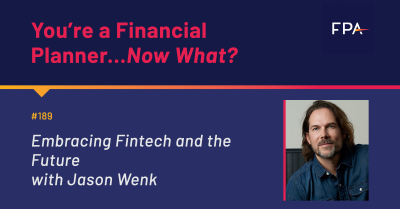
In our latest episode, I’m featuring an interview I was super excited to have with YAFPNW guest, Jason Wenk. Jason is the founder and CEO of Altruist, a digital brokerage platform that empowers financial planners to be better and more efficient in their work. In turn, Altruist makes financial advice more accessible for more people. Jason and I talked about the inspiration for Altruist, why robo-advisors won’t take over our jobs, and how new generations of clients in 20 years will change the profession.
How Altruist came to be and what it does for the profession
Jason has worked in the RIA space since 2004. Through the years, he found himself asking simple questions about the way things were. Why is it so hard to open an account? Why is this accounting and management software so expensive and cumbersome? When he was running a TAMP, Jason realized they were spending over $200k on software. Cost-effective, scalable tech didn’t exist for advisors. That created inefficiencies and limitations on clients to work with. Altruist works to fix that by allowing advisors to scale and broaden their clientele. Beginning investors, clients with no assets, clients of any net worth: Altruist makes it possible to work with them all.
When you begin as a financial planner, what you’re most worried about is finding clients before the clock runs out. If we can’t, ultimately we have to raise our minimum and charge clients more. Unfortunately, that means we also exclude other clients from our financial planning services. That’s another problem, Jason said. We should be trying to close wealth gaps and make financial advice and decision-making more accessible for everyone.
“In theory, we can take care of five or 10 times as many clients and actually do better work for them,” said Jason. “And that makes good financial advice and good financial planners more accessible, because we're not all capped at maybe 50 to 150 client relationships.”
It’s not all up to fintech to improve financial planning
Although Jason is a big proponent of fintech, that doesn’t mean he thinks we humans will eventually be replaced by technology. In fact, the advancements in technology will make human advice in financial planning more in demand. To meet that demand and be better at the profession, we need to understand how fintech is advancing and embrace it, rather than be scared of it.
We can’t remain stuck in our ways and expect to create a lasting business. Remember that the next generation of clients are kids that are in elementary and middle school now, Jason said. Kids today are more comfortable using mobile apps like Venmo and Cash App, and digital banking services. We have to understand where fintech is now and where it’s headed to best serve our clients.
Seeing this kind of change is a great long-term goal for the profession, but what about the short-term? What can we start changing now? For one thing, we can simply get more people into financial planning: more young professionals, more women, more minorities. If the goal is to make financial advice more accessible to more people, said Jason, we need to have financial planners who reflect the communities we want to serve.
Looking towards the future
Financial advisors have to step up their game, yes, but Jason is excited to see how fintech will advance to help us in the years to come. Automation, for one thing, is a current weakness in financial planning applications. We need better automation to allow us to serve more clients and deliver better outcomes, with less work input. Better tech and better automation will allow us to spend more time helping our clients. If financial planning is our passion, that’s what we should spend most of our time doing, after all.
What You’ll Learn:
- What inspired Jason to start Altruist
- What Altruist does for financial advisors
- Why the B2B side of fintech needs to step up their game
- The strengths and weaknesses of robo-advisors
- How tech has affected the profession for both clients and advisors
- The next big innovation in financial planning
- The key to using fintech in a smart way
- Working with high net worth clients vs. newer generations of clients
- How we can make financial planning more accessible
- Jason’s short-term and long-term vision for the profession
Show Notes:
In this episode of YAFPNW, I talk to Jason Wenk about:
- Altruist
- His previous work with FormulaFolios and Retirement Wealth
- Acorns, a micro investing app
- “Every Tech Company Wants to Be a Bank--Someday, At Least”
Want to follow Jason on social media? Check out his LinkedIn and Twitter page at @jasonwenk.